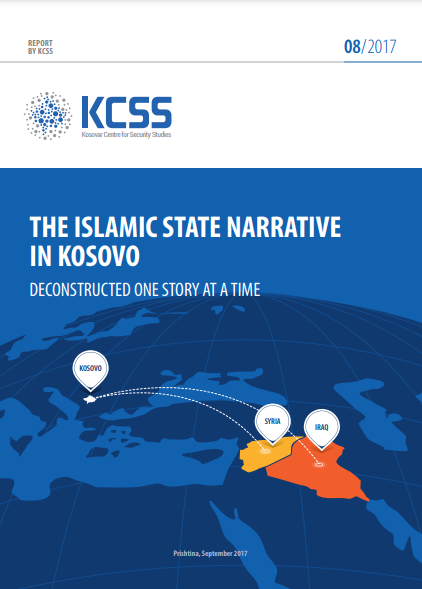21/09/2017

Kosovar Centre for Security Studies (KCSS)
US State Department
Garentina Kraja
Since the first reports of Kosovo citizens joining the Islamic State, or the IS1 , emerged in 2012, Kosovo institutions and society continue to grapple with the push and pull factors that led some 300 of its citizens – one of the highest flow of foreign fighters per capita in Europe, while on basis of per capita Muslim population remains much lower2 - to join the IS in Syria and Iraq. To date, much effort has been put in dissecting and understanding the root causes of violent extremism in Kosovo. Several studies3 have consistently found a mix of tangible internal conditions – weak economy, political instability, poor education system and the rise of various Islamic nongovernmental organizations4 competing in Kosovo’s newly democratized public sphere, as well as a list of less stringent circumstances, such as issues of identity, belonging, purpose and social isolation or outright exclusion. Other studies have prescribed the emergence of this phenomenon in Kosovo to the work of faith-based Islamic organizations that promoted a pan-Muslim identity, galvanized by the wars in the Middle East.5 Given the potency of the IS propaganda to catalyze the radicalization process and its role in inspiring individuals to commit themselves to violent extremism, KCSS compiled this report with the aim to identify, deconstruct, analyze, contextualize and interpret the IS propaganda targeting Kosovo Albanians as well as to reveal the tools employed to spread this narrative among different audiences in Kosovo. Throughout the report, we define the IS narrative as a term that in the broader sense encompasses the terrorist organization’s worldview, its political and religious ideology and more specifically the way it is told to audiences in Kosovo. While the IS propaganda has become a “comprehensive brand”6 spanning several languages and contexts, this report focuses on how IS propaganda adapted its narrative to the local context in Kosovo. In Kosovo’s case, this report finds that the narrative, while laced with religious language and injected with Koranic verses, in essence speaks to local issues. It seeks to utilize local disgruntlement, past grievances as well as events pertaining to the 1998-1999 to mobilize its supporters in Kosovo.
This report aims to identify, deconstruct, analyze, contextualize and interpret the IS propaganda targeting Kosovo Albanians as well as to reveal the tools employed to spread this narrative among different audiences in Kosovo. Throughout the report, we define the IS narrative as a term that in the broader sense encompasses the terrorist organization’s worldview, its political and religious ideology and more specifically the way it is told to audiences in Kosovo.
This project was funded through US State Department, Counter Terrorism Bureau (CT Bureau) grant, and was implemented in coordination with the U.S. Embassy, Pristina